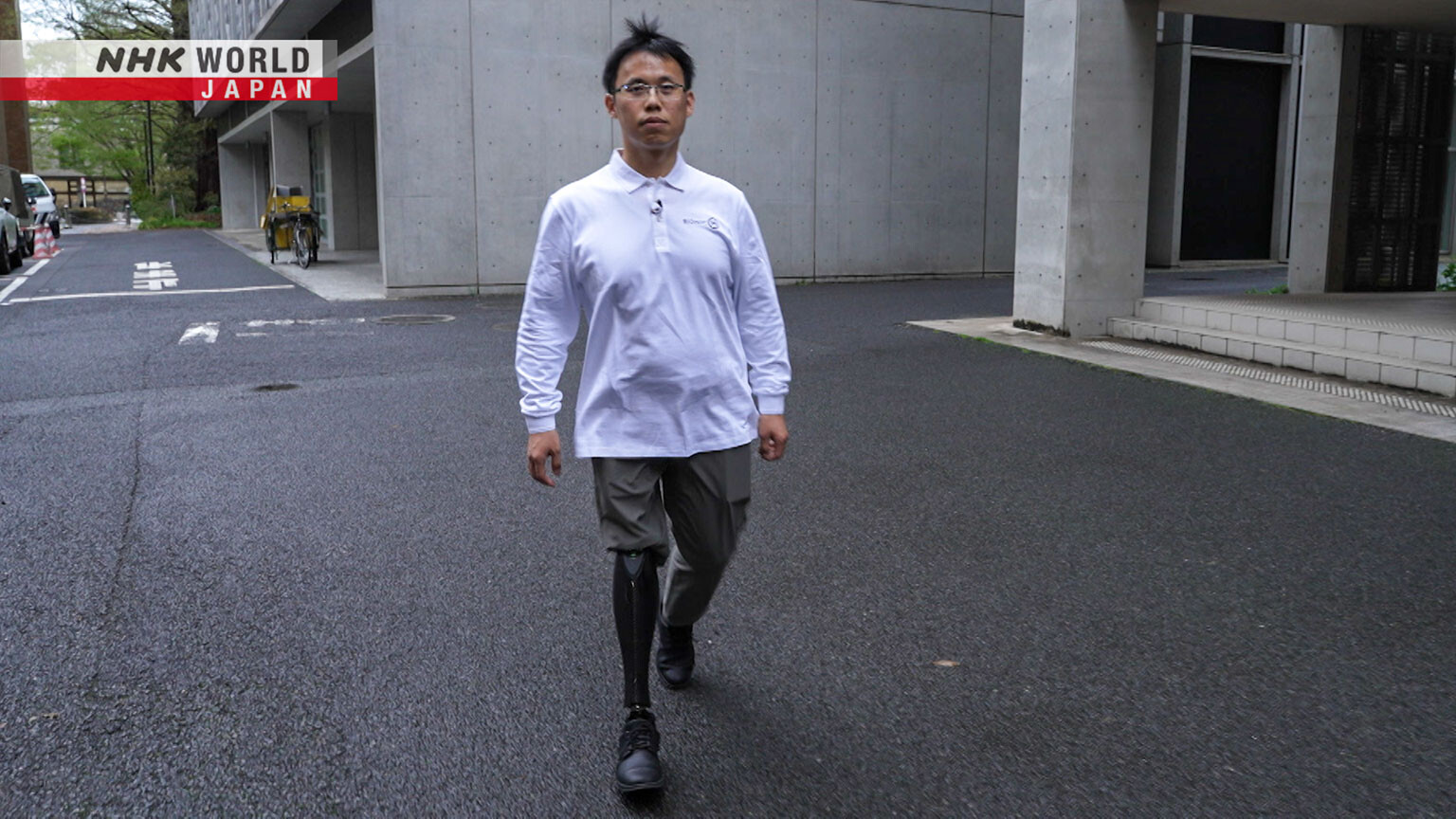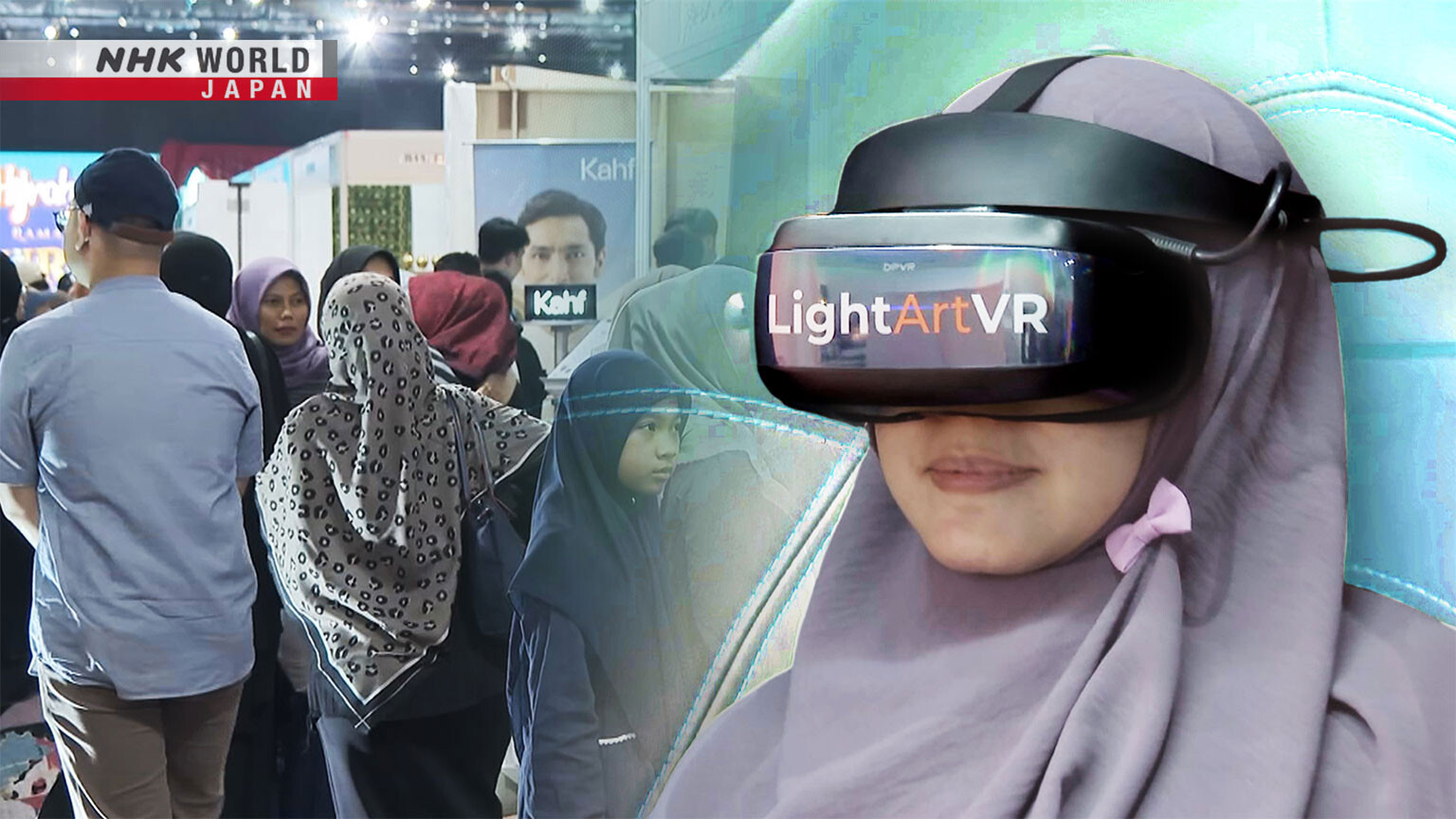Choosing Japan as a Business Home - Sun Xiaojun
[On-Site Report: Choosing Japan as a Business Home - Sun Xiaojun]
This week's episode features engineer and entrepreneur Sun Xiaojun, who decided to stay in Japan after earning his PhD to start his own robotic prosthetic company.
*Subtitles and transcripts are available for video segments when viewed on our website.
On-Site Report: Choosing Japan as a Business Home - Sun Xiaojun

Global Trends: Indonesia Embraces the "Halal Lifestyle"
Indonesia has one of the world's biggest Muslim populations. Many people there have been embracing what's being called the Halal lifestyle ... something that's even spreading into the matchmaking business.


In Focus: Global Backlash Over China's Factory Output Plan
The world may be headed for a new era of trade friction as China lays out a plan to stoke its industrial sector. We look at why some countries are crying foul, especially when it comes to green energy.
Transcript
Earlier this month, US Treasury Secretary Janet Yellen visited the world's
second-largest economy to deliver a tough message...
China is producing too much and the world cannot absorb it.
"When the global market is flooded by artificially cheap Chinese products,
the viability of American and other foreign firms is put into question."
The US is not the only one raising concerns.
The EU is already investigating whether Chinese electric vehicle makers
have an unfair advantage over their European rivals.
Now it's looking into the renewable energy sector.
"We are launching a new inquiry into Chinese suppliers of wind turbines.
We are investigating conditions for the development of wind parks in Spain, Greece, France, Romania, and Bulgaria..."
China has been focusing on green-energy industries as one way
to wean the economy off its reliance on the crisis-hit property sector.
But some global leaders are saying China's depressed domestic demand means the nation's excess supply of EVs,
solar and wind power products will end up overseas.
The problem isn't new.
The US in particular has claimed China's export surge two decades ago damaged many of its manufacturers.
An expert says countries are bracing for an even greater impact this time.
"Back in the early 2000s, China only accounted for a small percentage of global exports.
But the share has increased significantly, so the impact is even bigger.
And Beijing is trying to reinvigorate the economy with investment in green energy...
the same industries that other countries are trying to boost demand for.
So I think leaders are trying hard to prevent a similar situation this time."
Beijing is pushing back over what its trading partners are saying.
"The notion that China's overcapacity harms the global market is a complete fallacy.
Those who spread that narrative to justify protectionism have nothing to gain from it
and will only destabilize and disrupt supply chains and hinder the world's green transition."
Fuji says Beijing's course is likely already set.
"If they reduce exports, where would they turn for demand?
So I think there's no other choice."
This could also mean there's a possibility that the US will increase tariffs
significantly for China's green energy exports, even under the Biden administration.
US President Joe Biden is already calling for steep tariff hikes on steel and aluminum from China.
The back and forth with Beijing may intensify as the US presidential election gets closer
and the EU works to nurture its green sector.
A Halal fair targeting people in their 20s and 30s was recently held in the Indonesian capital of Jakarta.
The venue was filled with booths selling various items,
including a rapidly expanding selection of Halal-certified cosmetics.
Visitors could also experience a VR simulation of the era when the Prophet Mohammed lived.
And a travel agency promoted pilgrimage tours guided by a religious scholar...
who has a big following on social media.
Such events are becoming increasingly popular in Indonesia, with one held almost every month.
"I always pay attention to what is permitted according to Islam."
"I am trying to follow what is recommended in Islam as much as possible in my daily life."
The market for halal-related goods and services has been expanding globally in recent years.
Some private-sector estimates value it at more than 2 trillion dollars.
One contributing factor is the "Halal lifestyle" trend...
fueled by influencers and musicians who have gained traction with young adults on social media.
It's touching almost all aspects of their lives,
from food and clothing to insurance and banking services.
One expert says many are looking at their faith from a new perspective.
"There's also a counter-cultural aspect to this phenomenon.
Until now, Western culture was deemed modern and progressive,
but now Muslims are seeking out cool elements within the religion of Islam."
Elements are also showing up in the world of matchmaking.
An app developed by this company boasts about 50,000 users who have signed on with goal of finding a partner.
Faces are blurred in profile photos because the emphasis is not on physical appearance.
Pairings are made based on shared faith and plans for the future.
Once matched, the two can meet in person, accompanied by guardians or a religious scholar.
So far, more than 250 couples have married after meeting on the app.
"It's great that it's gradually becoming popular.
I think it will provide good opportunities for young people to meet."
This couple met through the app and married in January of this year.
Both have been married before.
They say similarities in their personalities as well as faith were big factors in the match.
"I could not meet the appropriate partner last time.
Maybe Allah gave me another chance and showed me a more Islamic way."
"I am grateful to God for his divine timing of our meeting.
I want us to deepen our faith and become better people as a couple."
Whether it's promoting food and products that adhere to Islamic rules or helping people find a life partner,
the business of Halal is becoming a fabric of Indonesian society.
Sun Xiaojun is originally from China.
However, he now runs a startup in Japan that makes use
of his knowledge of robotics to produce innovative "powered prosthetics."
Starting off with Japan and China, he hopes to expand globally in the near future.
Today's On-Site Report features an in-depth interview that goes beyond the company and the product,
and finds out why Sun Xiaojun chose to set up his business in Japan.
At the age of 9, Sun Xiaojun had to have his right leg amputated due to an aggressive type of bone cancer.
Unable to afford a prosthetic, he was forced to use crutches for 15 years.
Believing that academics was his only path toward success,
he first entered a prestigious university in China
before coming to Japan's Tohoku university as an exchange student in 2009.
It was after coming to Japan, that he first tried using a prosthetic leg -
an experience that would change his life forever.
"I went 15 years without being able walk around on 2 legs,
so being able to walk like that again was a huge moment for me."
He was also thrilled to able to use his hands and arms freely again.
However, that didn't mean things were perfect.
Sun found there were still many challenges to using a prosthetic leg.
For example, wearers can only go up and down stairs one foot at a time.
And if they trip or stumble, they run the risk of losing their balance.
"The more I used a prosthetic leg, the more I became aware of the various issues it had.
As an engineer, I couldn't help but begin to think that I could create something better myself."
After deciding to turn his thoughts into a reality, Sun entered a doctoral program at The University of Tokyo.
Its Graduate School of Information Science and Technology is renowned for its cutting-edge robotics programs,
including humanoid robot research.
Sun set out to apply some of the technology used in robotics
to create a "powered prosthetic leg" that could provide wearers assistance when moving.
Just 3 years after beginning his research, Sun founded his company, BionicM.
"I started out with a dream to create a better prosthetic leg.
Once I achieved that, I felt I needed to commercialize it so I could make it available to people around the world."
Less than a year after creating his startup,
the company successfully raised nearly $1 million in funding from a venture capital firm
that invests in startups originating from the University of Tokyo.
However, product development didn't go as smoothly as the company's early success would lead you to believe.
Engineers struggled to include all of the safety features they wanted
while keeping the prosthetic's weight down.
"It was a difficult to come up with a design that was light,
yet still had the strength and power output needed to support and assist the body weight of a full-grown adult.
And figuring out the programming to recognize and quickly respond
to any sudden or unexpected movements by the wearer, was quite challenging."
If a powered prosthetic fails to provide the right amount of assistance to the wearer,
it could result in a dangerous fall.
During development, the company created 9 different prototypes as it went through a long process
that included rigorous testing of both its hardware and software.
Then, in 2021, 6 years after beginning research, the first prosthetic was ready for market.
The company first made it available for sale in China and Japan.
The powered prosthetic leg contains multiple sensors that can read the user's slightest movements
and then use electric motors to apply assistive power to the knee joint.
The prosthetic also moves much more naturally than standard prosthetics,
and behaves much like it would if the user were using their own muscles to propel forward.
If it strikes an obstacle, sensors can quickly halt forward progress
and direct the motors provide power in the opposite direction,
assisting the wearer in maintaining balance.
This alleviates one of the main concerns people have with wearing standard prosthetics.
74-year-old Iida Masatoshi has been trying out the powered prosthetic to get a sense for how it works in daily life.
About 20 years ago, he had to have his left leg amputated after being injured in a car accident.
"Being able to have a prosthetic that almost moves like you would normally move your own leg is revolutionary.
I think the benefits of using a powered prosthetic leg will become more apparent
as my overall muscle strength declines with age.
Eventually, my right leg will weaken even more,
so it would be nice if I can use my powered prosthetic leg to counter that a little."
Many elderly people who have been forced to stop wearing prosthetics
and transition to wheelchairs due to weakening muscle strength,
may now have a new option to consider in powered prosthetics
with the added support and safety they offer.
When it comes to starting a business in Japan,
Sun feels that one area that proved to be particularly difficult was in finding funding.
"The scale is completely different here.
America and China have a huge number of venture capital firms that are ready and willing to invest in startups,
but there aren't nearly as many here in Japan."
He says another problem in Japan is that many people here are unwilling
to take the risks involved with starting a business.
"I feel Japanese people tend to do a lot of research and carefully consider things in order to start a business.
But I think it's easy to overthink things.
If you focus on all the potential risks, you won't ever feel like starting a business.
In China, people don't think about things so deeply.
They just feel it's best to give something a try and if it doesn't work,
they can apply what they learned to their next venture."
On the other hand, he thinks the development process for his powered prosthetic
would have been quite difficult without Japanese staff.
"Japan has a lot of talented people when it comes to robotics.
All of my Japanese staff have extremely high standards,
and that gets reflected in the responses we get from our clients.
On the other hand, I think Chinese people place more value on speed,
so while their output will be higher, the quality of their products will be lower."
Currently, of BionicM's 14 employees, 12 of them are Japanese.
Sekiguchi Teppei has been with the company since its inception.
"I'm always surprised by Sun's sense of speed, scale,
and his passion for changing the world of prosthetic limbs.
Whenever I speak with him, I'm always reminded of and impressed by how differently we think."
When it comes to manufacturing,
Sun believes that Japan should try to take a cue from China when it comes to speed.
"I think it is a wonderful characteristic that the Japanese are so methodical
and particular about the way they manufacture things.
On the other hand, especially when doing a start-up,
if you don't produce results in a set period of time, you can't move on to the next step.
So in order to succeed, we need to combine the speed of China with the quality of Japan."